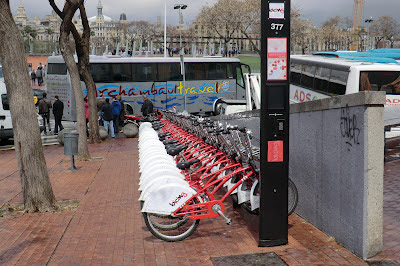 |
| The public bike has been an important contribution to ecomobility. Bicing in Barcelona |
People and goods transports always have had a close relationship with time. One of the economical concept foundations has been the time-distance relationship. Time is money. Time has been considered a cost to be reduced in order to gain economic and organizational efficiency. However, at present we begin to outline a different perception of time as a consumable value in itself while we travel. The information and communication technologies (IT) would modulate this new vision of time of transportation, especially when we are referring to the displacement of people.
During the last century until today another concept related to transport was consolidated with the automobile: the individual freedom of movement, which currently is highly evaluated. But everything evolves…even the values we consider untouchables. We remind the German philosopher Arthur Schopenhauer who said: “Change is the only immutable thing.” Although today the individual freedom of movement is still valid for us, it has become more complex to perform, when another perspective emerged in our society: the collective responsibility. From different points of view the collective responsibility is gaining more weight on our scale of values, the reason for which is the acquired knowledge of our impact on the ecosystems. An example is the traffic system. We know that when everyone does the best for themselves, they don’t necessarily do the optimal thing for the general system and they can even congest and collapse it. The most advanced societies acquire new values related to mobility, which doesn’t mean that we renounce the traditional values, which we already have assumed like precaution, safety, citizenship and sustainability. Renowned researchers like Ulrich Beck: Risk Society (1992) and George Amar: Homo mobilis (2011) explain the progress of these new values.
Nowadays any organization should be concerned about its image and the coherence of the message offered to their providers and clients through a corporate social responsibility (CSR) policy, so that it doesn’t lose market share or is expelled from it. We have obligations as consumers. We aren’t simply a number on their income statements. We are each day more conscious of our “empowerment” (a borrowed concept from George Amar referred to the access of information for the costumer, their critical capacity and influence, their decision making as a power they have on the producers and distributors to choose a product or service.)
Normally, we associate citizenship with respect for the rules created by experts and legislators, but now the participative nature of social networks redefines the concept of moderation to standard behaviours. From the digital world, where cross-communications is the norm between users, a new way has transcended to the offline world with a citizenship linked to other forms of governance, based in dialogue and exchanging arguments between its participants. Compared to this dichotomy: rules proposal by authority and trespass or submission by the citizens, now (slowly) emerges a way to make active listening and engagement with people, where rules are adopted by consensus between all actors. The definition of new urban mobility plans should apply these new planning and management parameters.
An ecological awareness emerges when people notice the dimension of consequences on a global scale from their small and individual decisions. Environmentalism has come to our society to stay permanently. The market is well aware of this change, and it has prepared this concept for integration into the system: the eco-consumers. Transport and mobility are not indifferent to this line of thought. Eco-mobility searches the effects of carbon footprint and its rebalancing as well as the reduction of pollution. New businesses are established like carpooling, car sharing, public services on demand, soft mobility, electro mobility… that are changing the way towards more efficient social and environmental transports.
 |
| Electro mobility is not only for motorcycles or cars. (In the photograf segway's users), |
Transport and mobility infrastructures are no longer measured and studied exclusively from indicators like km of railroads, km of highways, speed average, number of passengers, time in hours or days, tons, TEU or similar variables. Progressively new parameters are seeking to measure the values that emerge in our society which evaluate the nature and quality of transport modes, such as variety of services, facilities, safety, comfort, attraction… We measure the values generating new motivations for use, and the values of the environmental sustainability movement will make our growing environmental awareness more attractive.
Another posts:


No hay comentarios:
Publicar un comentario